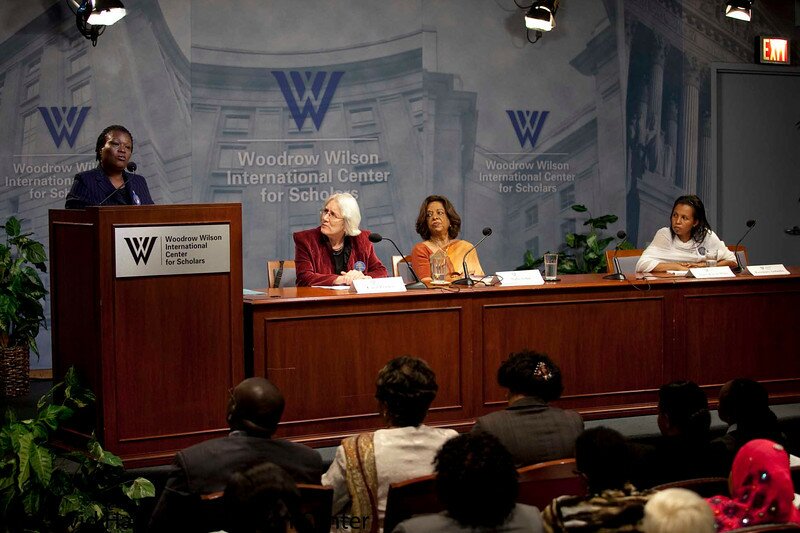Dr. Sadik: MDGs require women to have 'autonomy over their sexual health'
 Rosemary Ardayfio speaks while Carol Peasley, Dr. Nafis Sadik and Tigest Kassa Milko look on. Photo Credit Courtesy David Hawxhurst, Woodrow Wilson Center |
The 1994 International Conference on Population and Development (ICPD) was a ground breaking conference where 179 countries recognized that the empowerment of women was a major step towards alleviating poverty and stabilizing population growth. The Programme of Action that resulted from the conference was reflected in the Millennium Development Goals (MDGs) in many areas such as gender equality. However there was one glaring omission from the main goals of the MDGs: universal access to reproductive health and family planning.
At the Woodrow Wilson Center’s event “Strengthening the Voices of Women Champions for Family Planning and Reproductive Health,” Dr. Nafis Sadik called attention to the fact that the MDGs included universal access to reproductive health as one of the sub-targets of MDG 5: Improving Maternal Health, instead of as a goal itself. The exclusion of universal access to reproductive health as an MDG is a grave oversight, Dr. Sadik, special adviser to the UN Secretary-General and special envoy for HIV/AIDS in Asia, told the audience because, “Most goals require women gaining autonomy over their sexual health.”
Its absence can be attributed to politics. “International family planning and reproductive health issues have become a partisan football used to score political points,” CEDPA’s president and CEO Carol Peasley told the audience. However, advocates or ‘champions’ can change the way the issues are viewed, Peasley continued, “The voices of women champions may be the best way to influence policy makers.”
Many champions from African countries were in attendance of the event and shared their successes and challenges in supporting reproductive health and family planning. Tigest Kassa Milko, the health communications program coordinator for Panos Ethiopia, told the crowd how producing a radio show is helping to reach rural women. Rosemary Ardayfio, a newspaper editor from Ghana, also emphasized the role the media can play in building support for family planning. Her paper spreads correct and reliable information about reproductive health. Other news outlets should follow her lead, she said, as a well-informed media can be a powerful source for influencing change.
In Mali, change is happening. The MLI country’s government is piloting community-based health insurance, or mutuelles, which includes family planning as a preventative benefit. If successful, mutuelles could help Mali achieve universal access to family planning among its population.
For governments like Mali and local champions such as Milko and Ardayfio, their work is continuously threatened by shifts in international donor policy and available funding. Influential countries can help prevent this instability. Speaking about the important role that the United States plays in influencing global support for family planning, Dr. Sadik said, “The US can thread the needle,” for global action ensuring universal access to reproductive health and family planning.
Keyword Search
MLI works with ministries of health to advance country ownership and leadership. This blog covers issues affecting the ministries and the people they serve.
Connect with Us
![]()
![]()
Categories
Blogs We Like
- Africa Can End Poverty
- Africa Governance Initiative
- Behind the Numbers
- CapacityPlus
- Center for Global Health R&D Policy Assessment
- Center for Global Development: Global Health Policy
- Center for Health Market Innovations
- Global Health
- Global Health Hub
- Global Health Impact
- The New Security Beat
- PAI Blog
- RH Reality Check
- Save the Children
- Transparency and Accountability Program
Contact Us
Please direct all inquiries to
